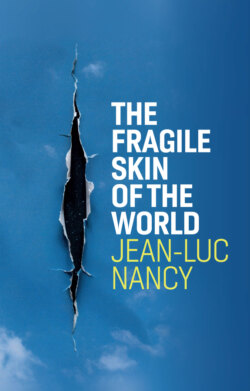Читать книгу The Fragile Skin of the World - Jean-Luc Nancy - Страница 9
2
ОглавлениеIt is thus necessary for us to extricate ourselves from mourning as well as from the representation that we mourn: that of mastered history. This speaks to the ambivalence of the term ‘Anthropocene’: it is understandable (at least partially) if it designates the substitution of natural forces by man; but if it seeks, in doing so, to welcome a mastery and an autonomy (not to say autocracy) on the part of man, it represses the enormous uncertainty, indeed the folly, in which this mastery is engaged (and in which it is beginning to realize, in anguish, that it is engaged).
This is why I want to speak about a time to come with neither past nor future. In other words, to link up with what I have just said, of the approach and the coming about of an unknown, from whose emergence neither the past nor the future can save us.
There is nothing new about emergence, whether in history or in pre-history. After all, the world is an emergence: not only does it emerge from the non-world, but it ceaselessly emerges to itself, from energy to deflagration, from gatherings to explosions, from molecules to cells and from cells to brontosauruses, to quadrupeds, to hominids, to ziggurats, and to steam engines. What precedes has never seen the coming of what follows. The space-time of the world – indeed, of plural worlds – is at bottom nothing but an emergence, one that is infinitely more ancient than any antiquity.
This also means that beginning and end are inherent to and consubstantial with space-time – that is, with the distension and the expansion of the thing itself; that is, of the real or of the ex-istent nothing.
I don’t want to venture into the silence of the outside that surrounds the thing itself as soon as it emerges. Myths have made splendid use of this silence for a long time, as has physics. Many poets have also done so, like Octavio Paz, who speaks of . . .
the other face of being,
the empty one,
the fixed featureless splendour.2
I simply want to make something of this splendour and this silence resonate for us, now, such that we might understand that instead of wanting to detect and decode messages of the origin and the end, we must come to terms with the silence and the darkness at the heart of every convulsion and every emergence – whether of the collision of particles, the birth and death of living beings, our meditations, or our deliriums.
What Clarice Lispector, in an astonishing ellipsis, names the creative unconscious of the world.
Because the Real (or the Nothing) neither precedes nor follows the world: space-time isn’t plunged in another space-time. It’s the only one, however multiple it is and however abundant its aspects and stories. It is therefore not outside: there is no outside except inside, at the most intimate level, where emergence happens – folding, cracking, breaking, articulating.
It is true that this seems very metaphysical, very exaggerated or emphatic. But in fact it is that which exceeds every metaphysics and every emphasis, every consideration and every discourse. And makes us open our eyes and speak.
The paradox could not be more logical: it is when we experience the strongest tremor that we must take some distance, take a step back. Indeed, this is what tremors impose upon and propose to us. The history of progress is complete, another history has begun in this very completion. We can’t discern it at all. We must watch its invisibility, since it is within this invisibility that it comes towards us. Which means that it has already begun, unbeknownst to us, and will only become identifiable once it has already attained an advanced age.
Kant himself, at the height of his confidence in a rational history (the sign of which he saw in the emergence of the Enlightenment), Kant himself knew that he could only project the accomplishment of this history onto a time to come so far away that he almost considered it asymptotic. Yet it is precisely rational history, or historical reason, that is being eclipsed before our eyes. This is how it is to come without past or future.
